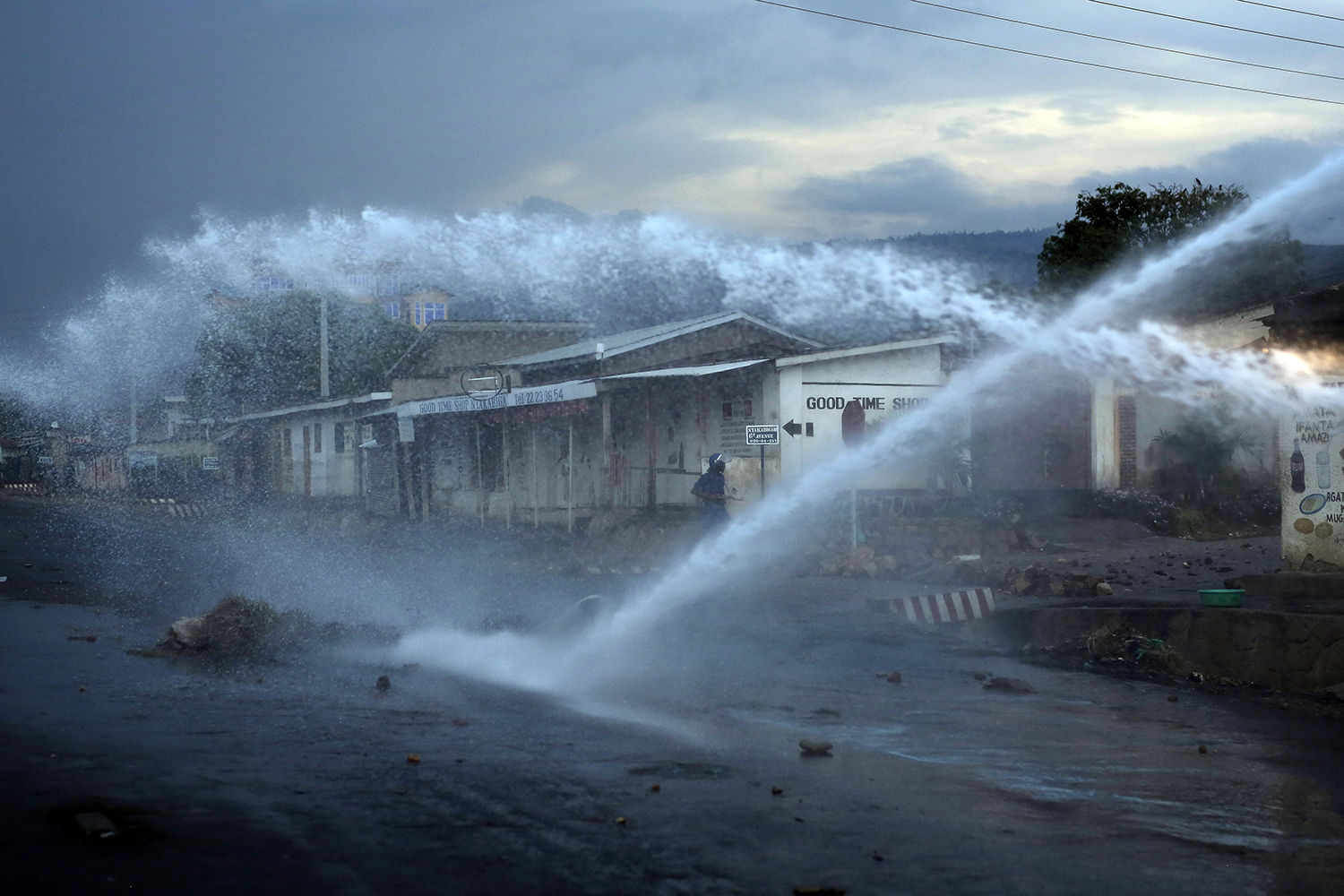
The current Ebola outbreak has spiraled into the highest number of cases on record. AP photojournalist Jerome Delay covers the effects of Ebola on the city of Monrovia, Liberia. To read about Jerome Delay's experience covering the Ebola outbreak, visit AP's Big Story.
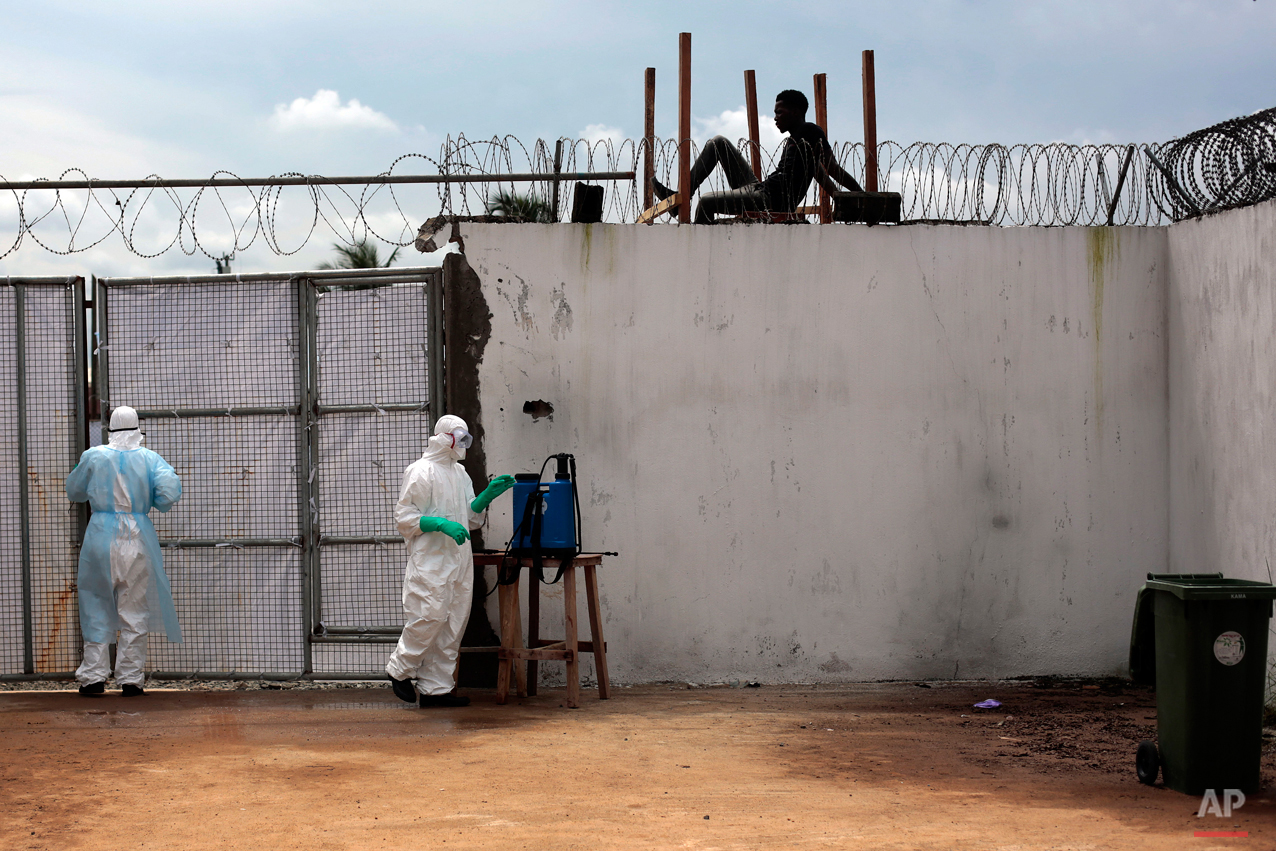
Liberia Ebola
Health workers stand outside the Island Clinic Ebola isolation and treatment center in Monrovia, Liberia, Friday Sept. 26, 2014. The outbreak of Ebola has overwhelmed the weak health systems of some of the world's poorest countries - there aren't enough doctors and nurses or even clinics to treat the spiraling number of cases.(AP Photo/Jerome Delay)
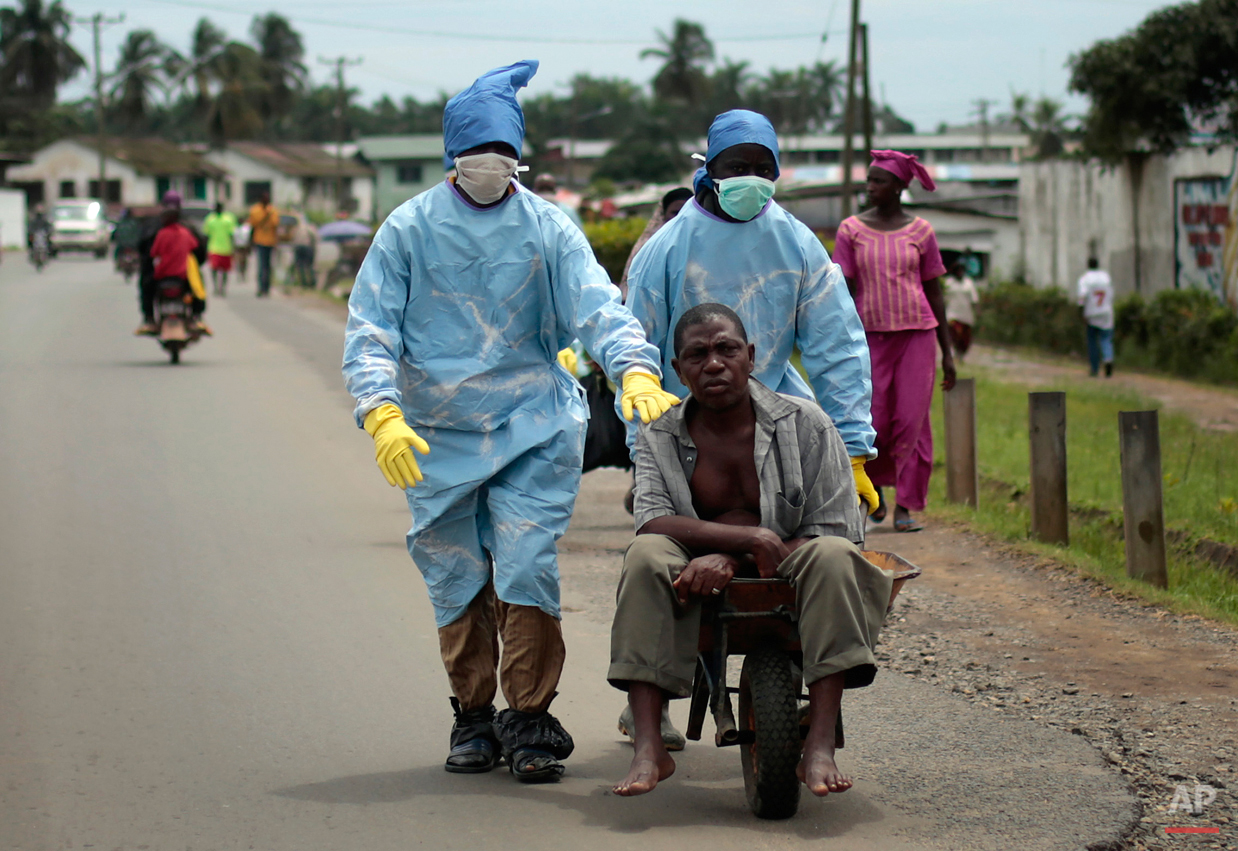
Ebola Liberia
Residents of the St. Paul Bridge neighborhood wearing personal protective equipment take a man suspected of carrying the Ebola virus to the Island Clinic in Monrovia, Liberia, Sunday Sept. 28, 2014. Six months into the worldís worst-ever Ebola outbreak, and the first to happen in an unprepared West Africa, the gap between what has been sent by other countries and private groups and what is desperately needed is huge. Even as countries try to marshal more resources to close the gap, those needs threaten to become much greater, and possibly even insurmountable. (AP Photo/Jerome Delay)
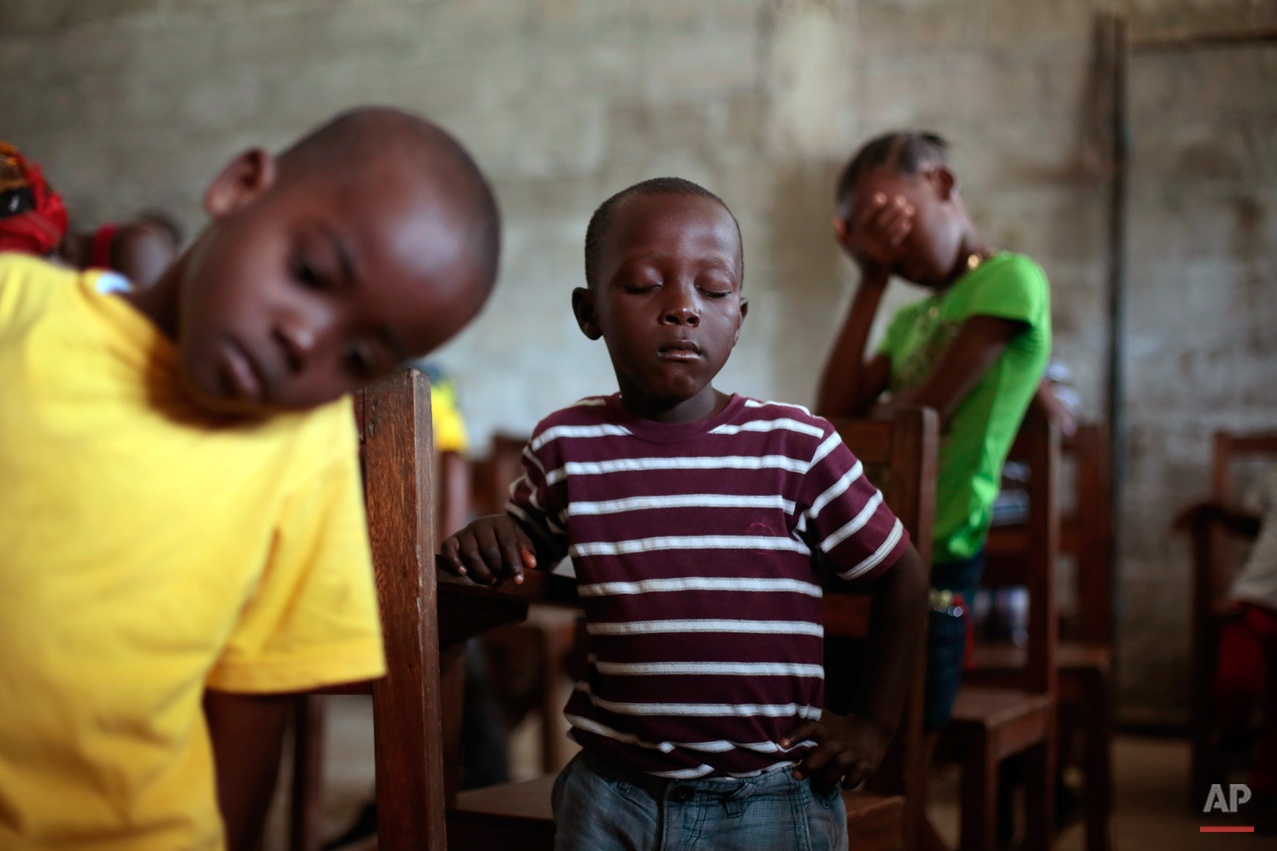
APTOPIX Ebola Liberia
Children pray during Sunday service at the Bridgeway Baptist Church in the St. Paul Bridge neighborhood of Monrovia, Liberia, Sunday Sept. 28, 2014. Six months into the worldís worst-ever Ebola outbreak, and the first to happen in an unprepared West Africa, the gap between what has been sent by other countries and private groups and what is desperately needed is huge. Even as countries try to marshal more resources to close the gap, those needs threaten to become much greater, and possibly even insurmountable. (AP Photo/Jerome Delay)
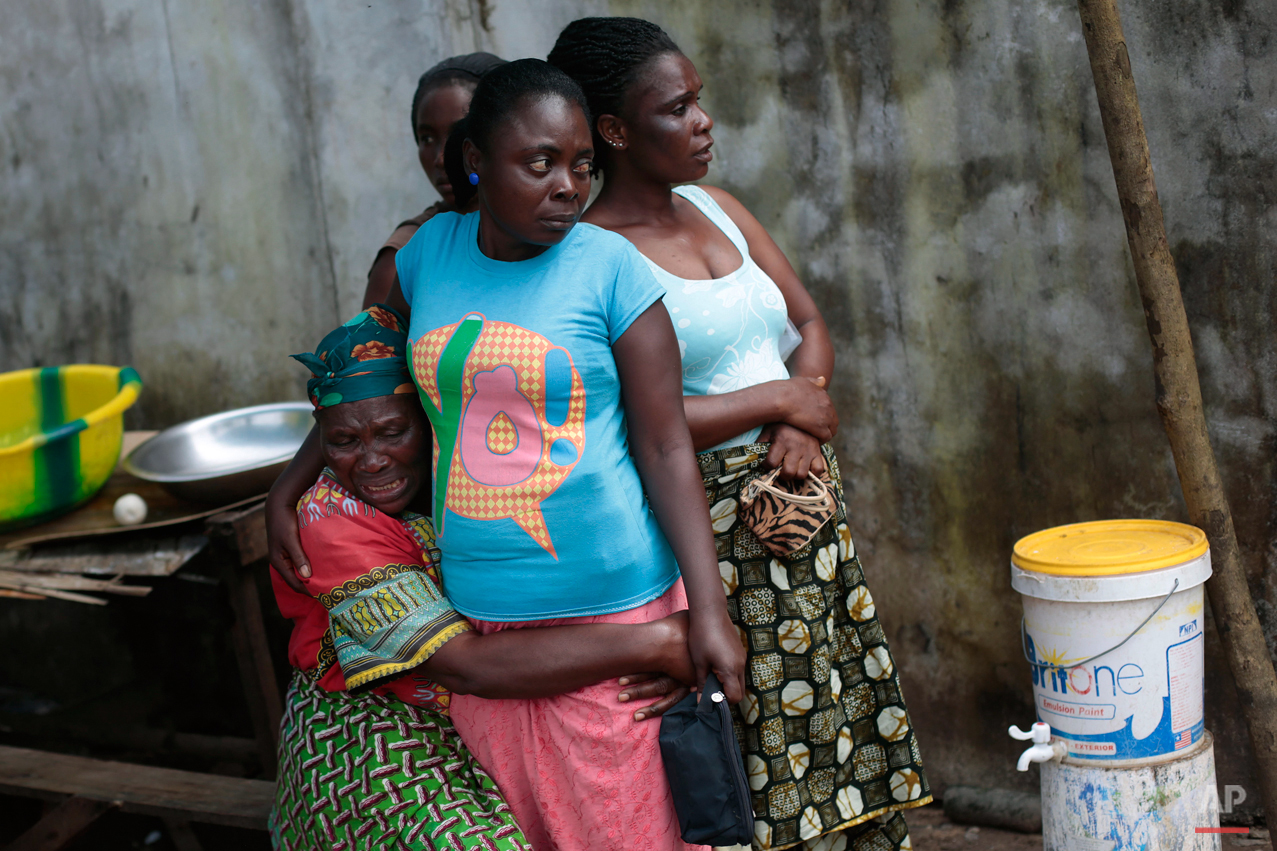
Liberia Ebola
Ethel Konneh, left, is consoled by her daughters outside the Island Clinic Ebola isolation and treatment center, after she learned her other daughter Rose past away from Ebola in Monrovia, Liberia, Friday Sept. 26, 2014. The outbreak of Ebola has overwhelmed the weak health systems of some of the world's poorest countries - there aren't enough doctors and nurses or even clinics to treat the spiraling number of cases.(AP Photo/Jerome Delay)
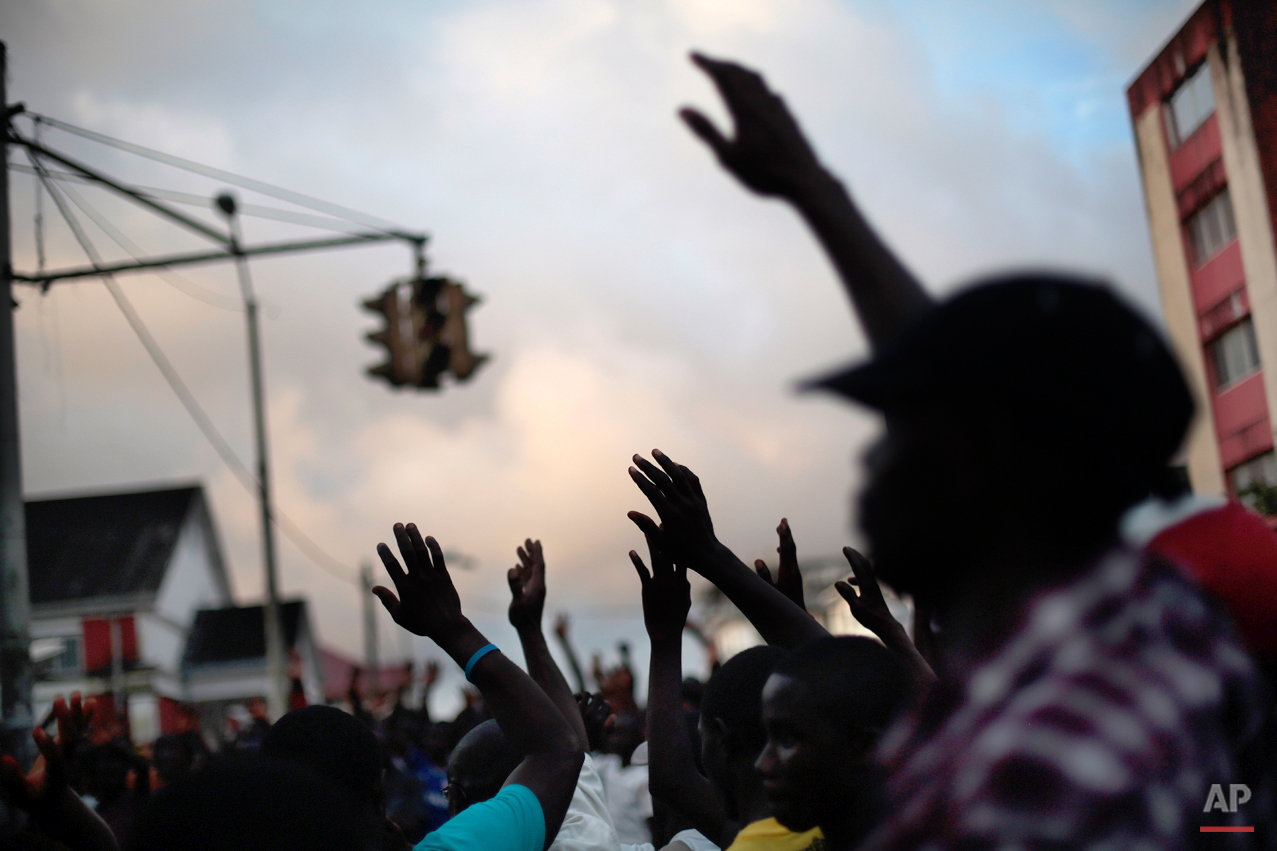
APTOPIX Liberia Ebola
Bystanders listen to a street preacher calling on people to raise their hands and "Wave Ebola Bye Bye" in Monrovia, Liberia, Saturday Sept. 27, 2014. Six months into the worldís worst-ever Ebola outbreak, and the first to happen in an unprepared West Africa, the gap between what has been sent by other countries and private groups and what is desperately needed is huge. Even as countries try to marshal more resources to close the gap, those needs threaten to become much greater, and possibly even insurmountable. (AP Photo/Jerome Delay)
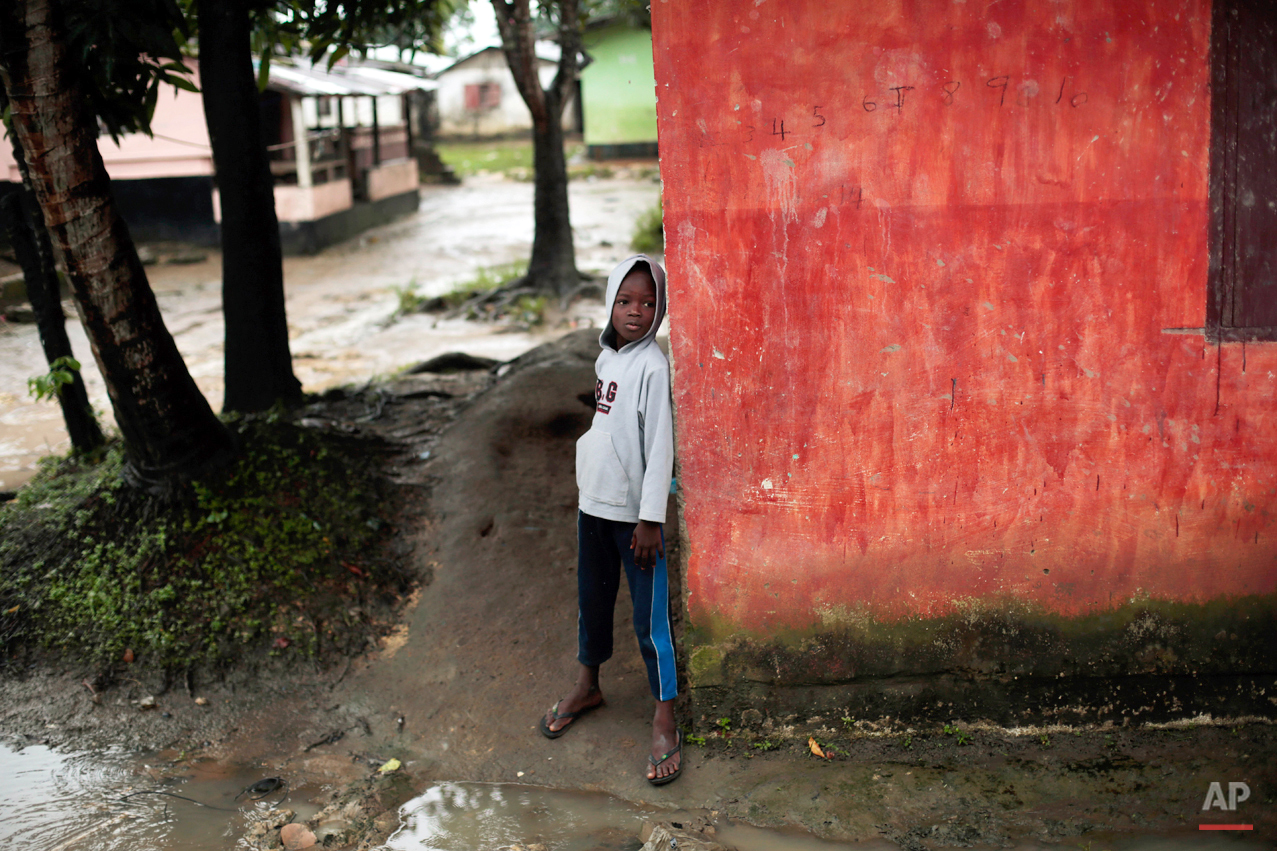
Ebola Liberia
A young boy waits for the rain to stop in the St. Paul Bridge neighborhood of Monrovia, Liberia, Sunday Sept. 28, 2014. Since early July, 42 people have died in the neighborhood from the deadly Ebola virus. Six months into the worldís worst-ever Ebola outbreak, and the first to happen in an unprepared West Africa, the gap between what has been sent by other countries and private groups and what is desperately needed is huge. Even as countries try to marshal more resources to close the gap, those needs threaten to become much greater, and possibly even insurmountable. (AP Photo/Jerome Delay)
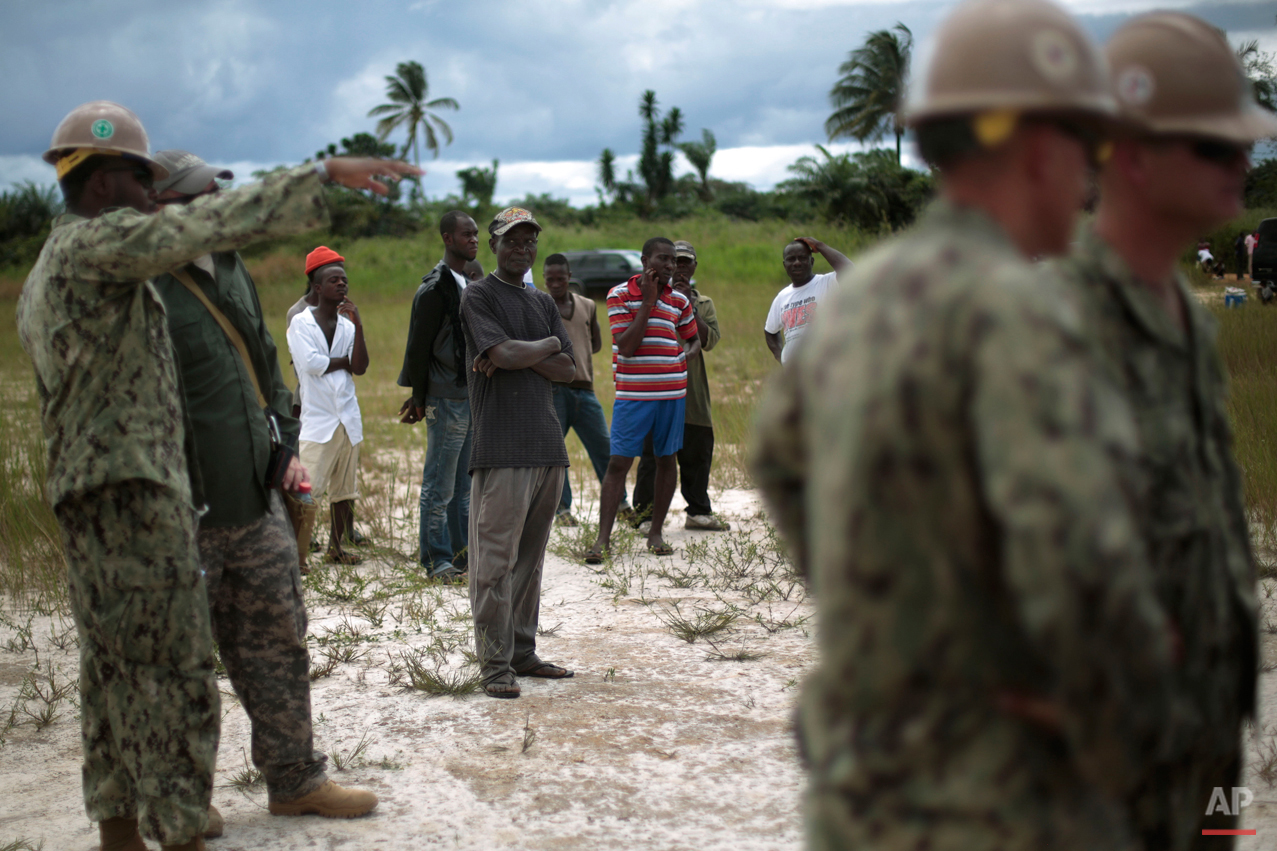
Ebola Liberia
Local workers look on as a team or U.S. Navy engineers prepares the ground for a 25-beds medical facility they are building next to the airport in Monrovia, Liberia, Saturday Sept. 27, 2014. Six months into the worldís worst-ever Ebola outbreak, and the first to happen in an unprepared West Africa, the gap between what has been sent by other countries and private groups and what is desperately needed is huge. Even as countries try to marshal more resources to close the gap, those needs threaten to become much greater, and possibly even insurmountable. (AP Photo/Jerome Delay)
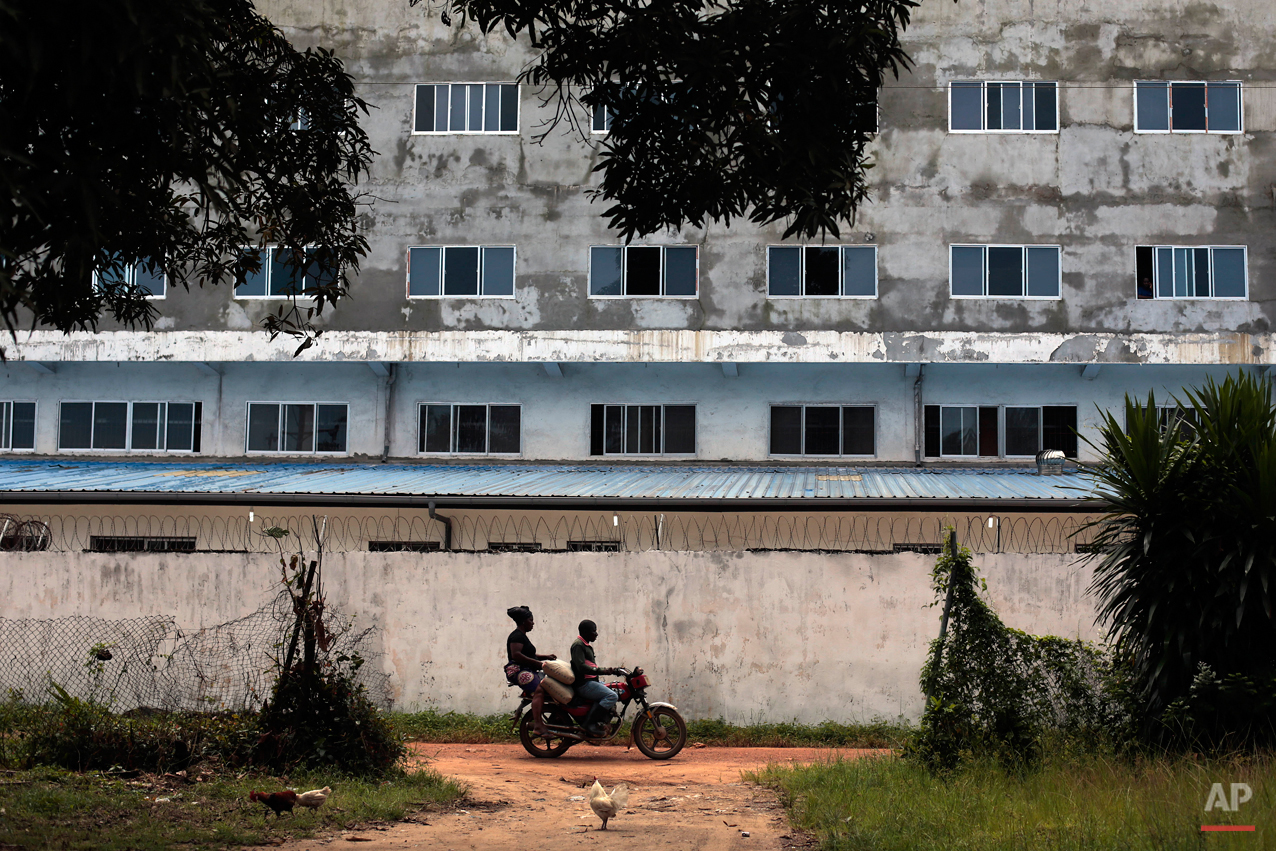
Liberia Ebola
A couple rides past the Island Clinic Ebola isolation and treatment center in Monrovia, Liberia, Friday Sept. 26, 2014. The outbreak of Ebola has overwhelmed the weak health systems of some of the world's poorest countries - there aren't enough doctors and nurses or even clinics to treat the spiraling number of cases.(AP Photo/Jerome Delay)
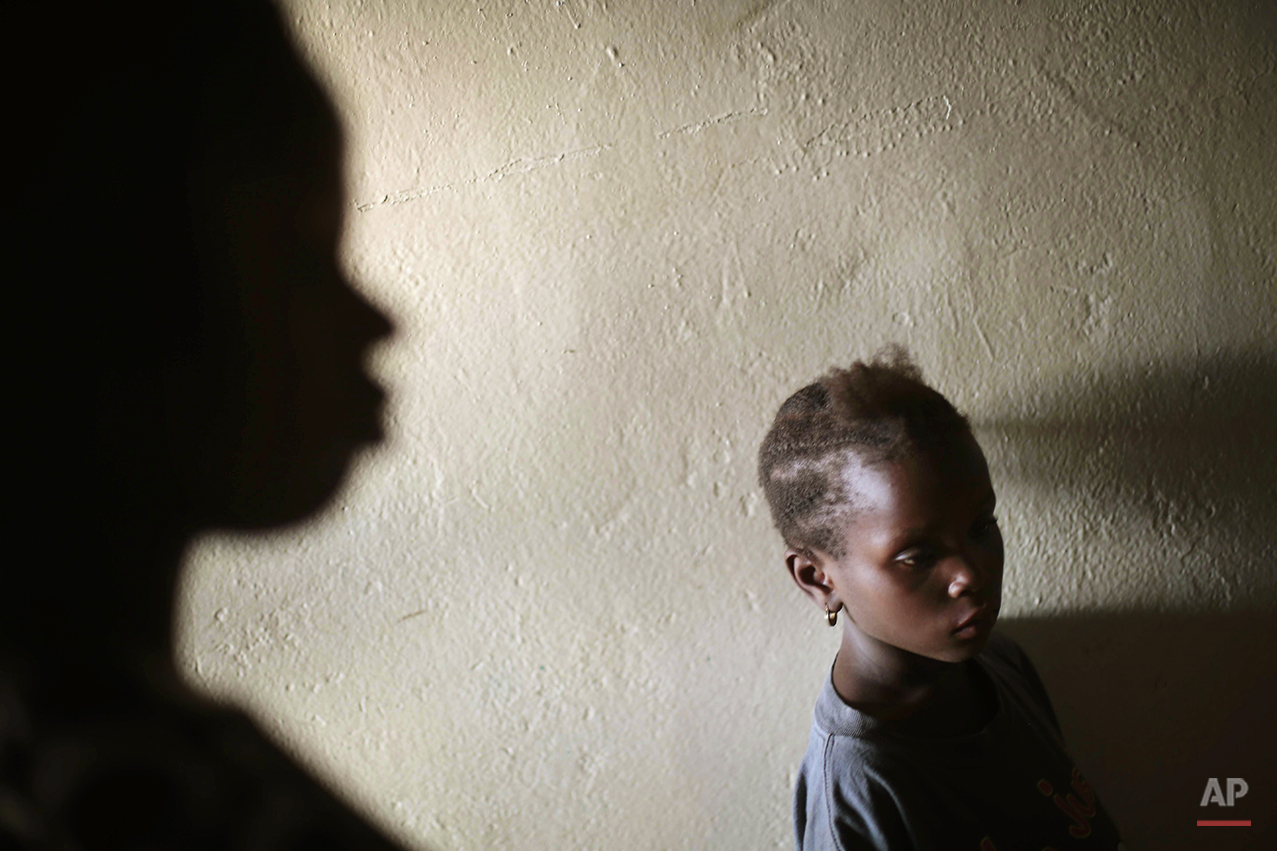
Liberia Ebola No Chance to Say Goodbye
In this picture taken Saturday, Sept. 27, 2014, Miamu Saryon, 7, stands in the hallway of Mawah clinic, in downtown Monrovia, Liberia. At left is Miamu's aunt, Linda Barlea. Miamu lost her mother, grand-mother and two uncles to Ebola. After surviving Ebola herself, Miamu was unable to go home with relatives after neighbors protested, wrongfully fearing she might still be contagious. As the death toll from Ebola soars, crowded clinics are turning over beds as quickly as patients are dying. This leaves social workers and psychologists struggling to keep pace and notify families, who must wait outside for fear of contagion. Also, under a government decree, all Ebola victims must be cremated, leaving families in unbearable pain with no chance for goodbye, no body to bury. (AP Photo/Jerome Delay)
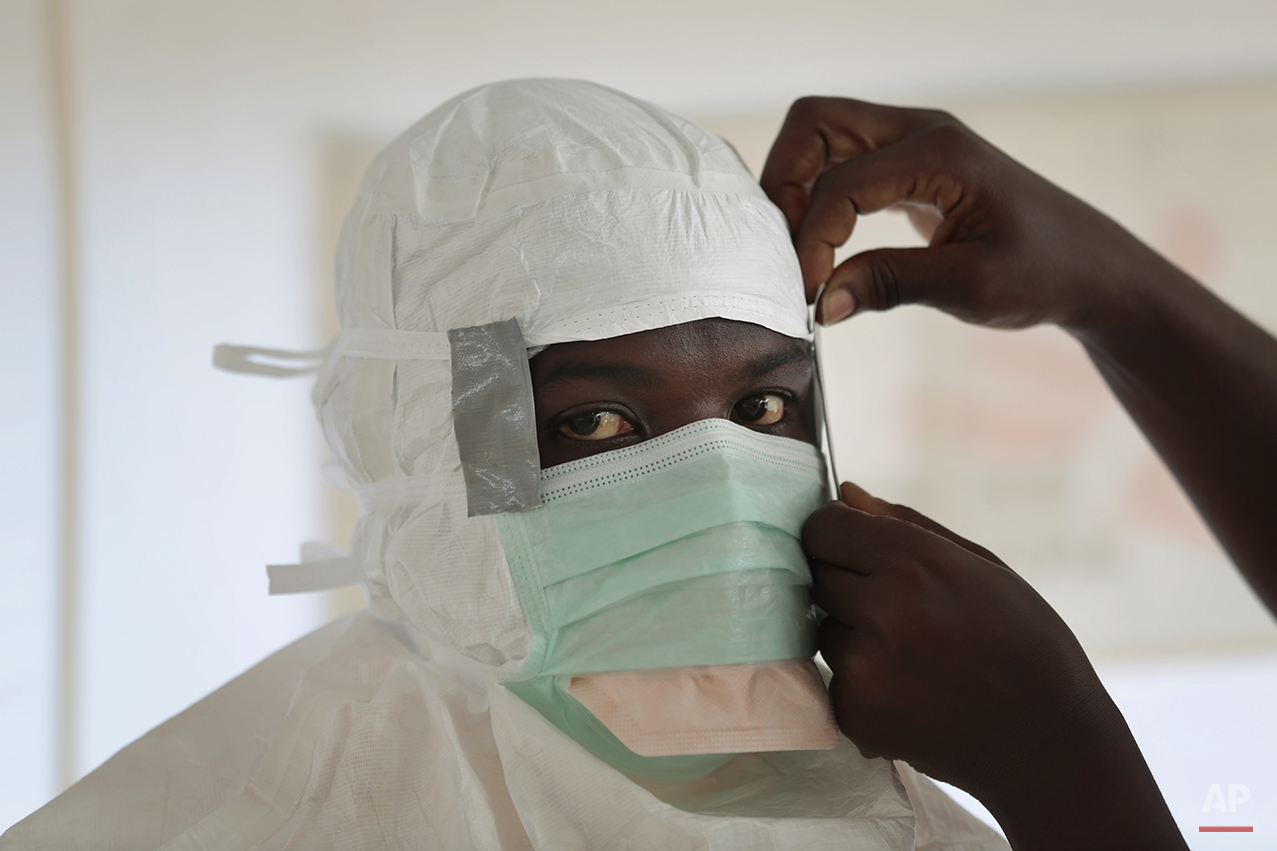
Ebola Liberia
An MSF (Medecins Sans Frontieres) nurse gets prepared with Personal Protection Equipment before entering a high risk zone of MSF's Ebola isolation and treatment centre in Monrovia, Liberia, Monday Sept. 29, 2014. Six months into the world’s worst-ever Ebola outbreak in West Africa authorities are desperately waiting for shipments of aid to help in the fight of this deadly disease. (AP Photo/Jerome Delay)
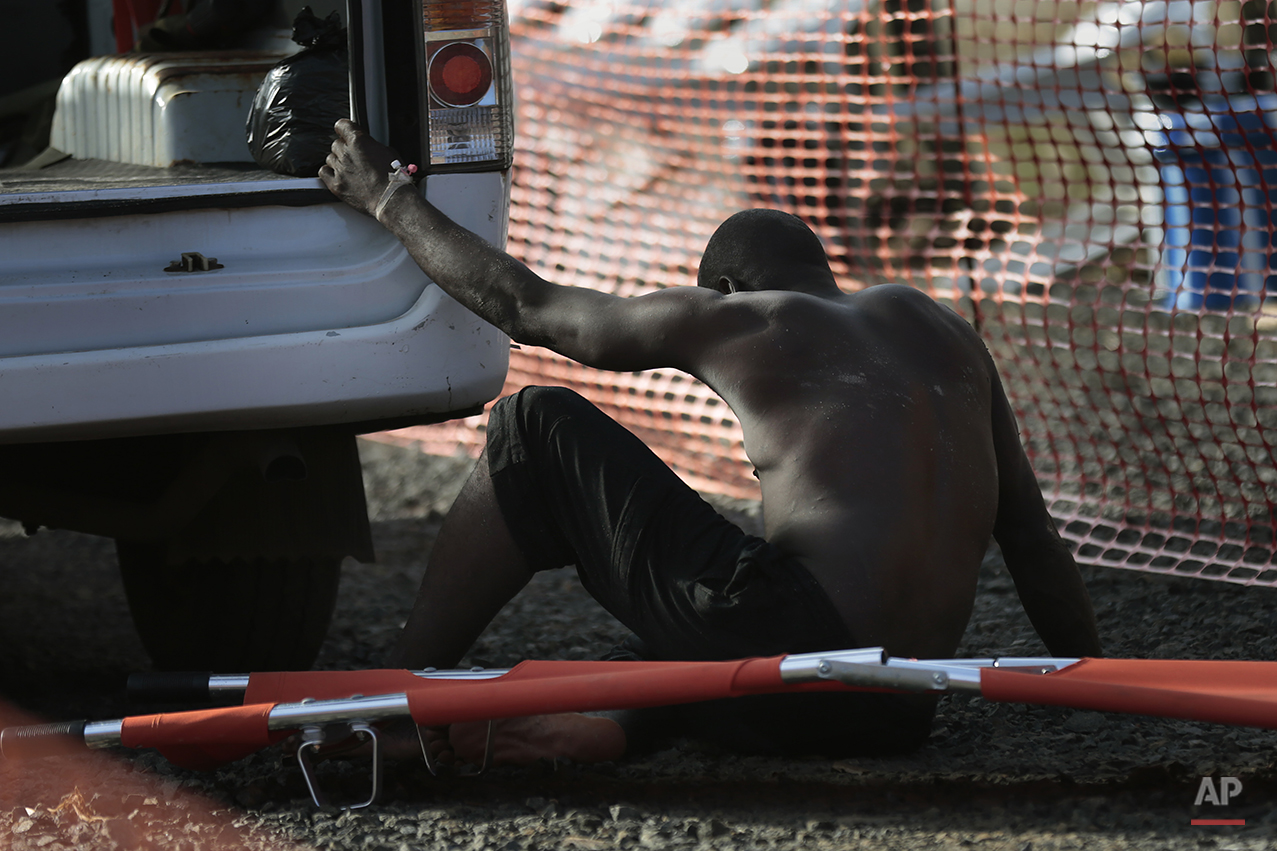
Ebola Liberia
A man too weak to walk arrives at the MSF (Medecins Sans Frontieres) Ebola isolation and treatment center in Monrovia, Liberia, Monday Sept. 29, 2014. Six months into the world’s worst-ever Ebola outbreak in West Africa authorities are desperately waiting for shipments of aid to help in the fight of this deadly disease. (AP Photo/Jerome Delay)
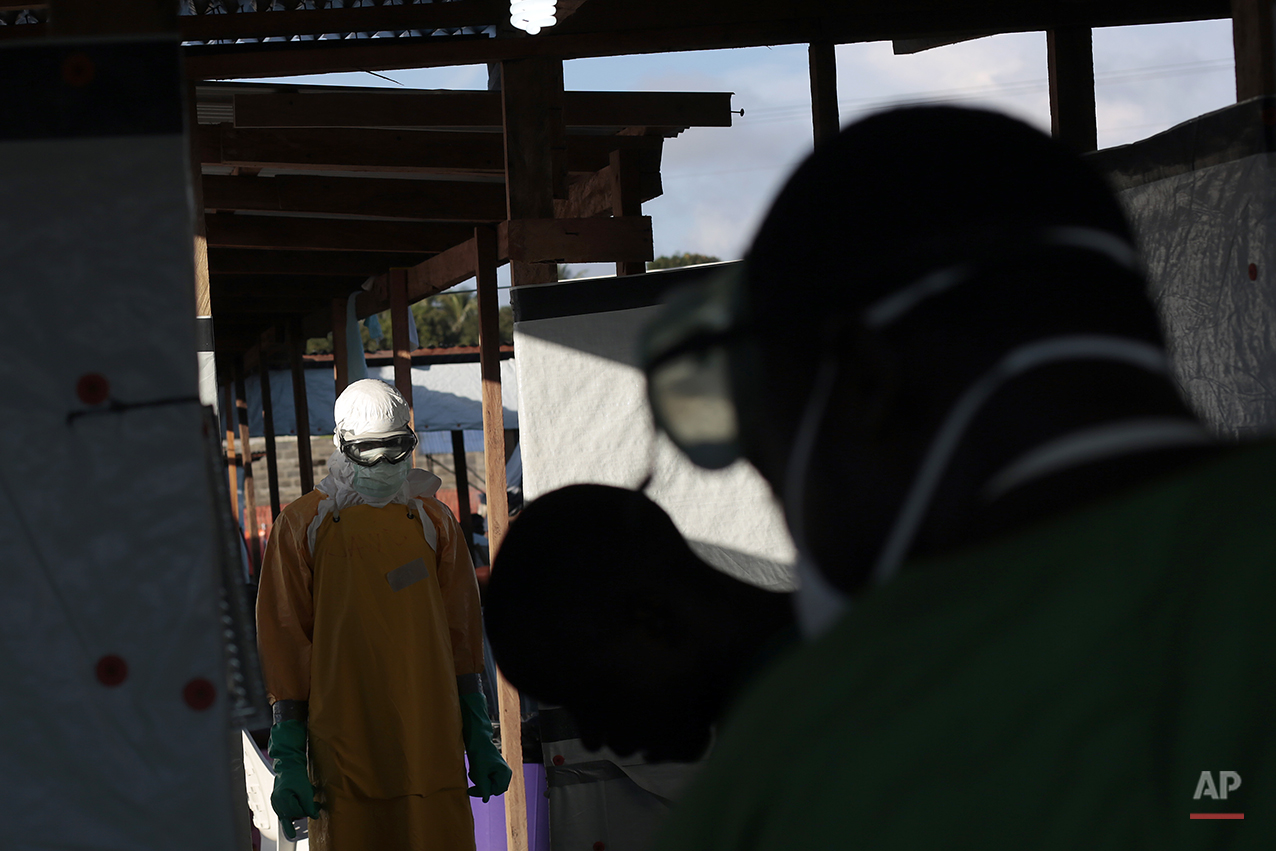
Ebola Liberia
An Medecins Sans Frontieres (MSF) worker is sprayed and disinfected as he leaves a high risk zone of MSF's Ebola isolation and treatment center in Monrovia, Liberia, Monday Sept. 29, 2014. Six months into the world’s worst-ever Ebola outbreak in West Africa authorities are desperately waiting for shipments of aid to help in the fight of this deadly disease.(AP Photo/Jerome Delay)
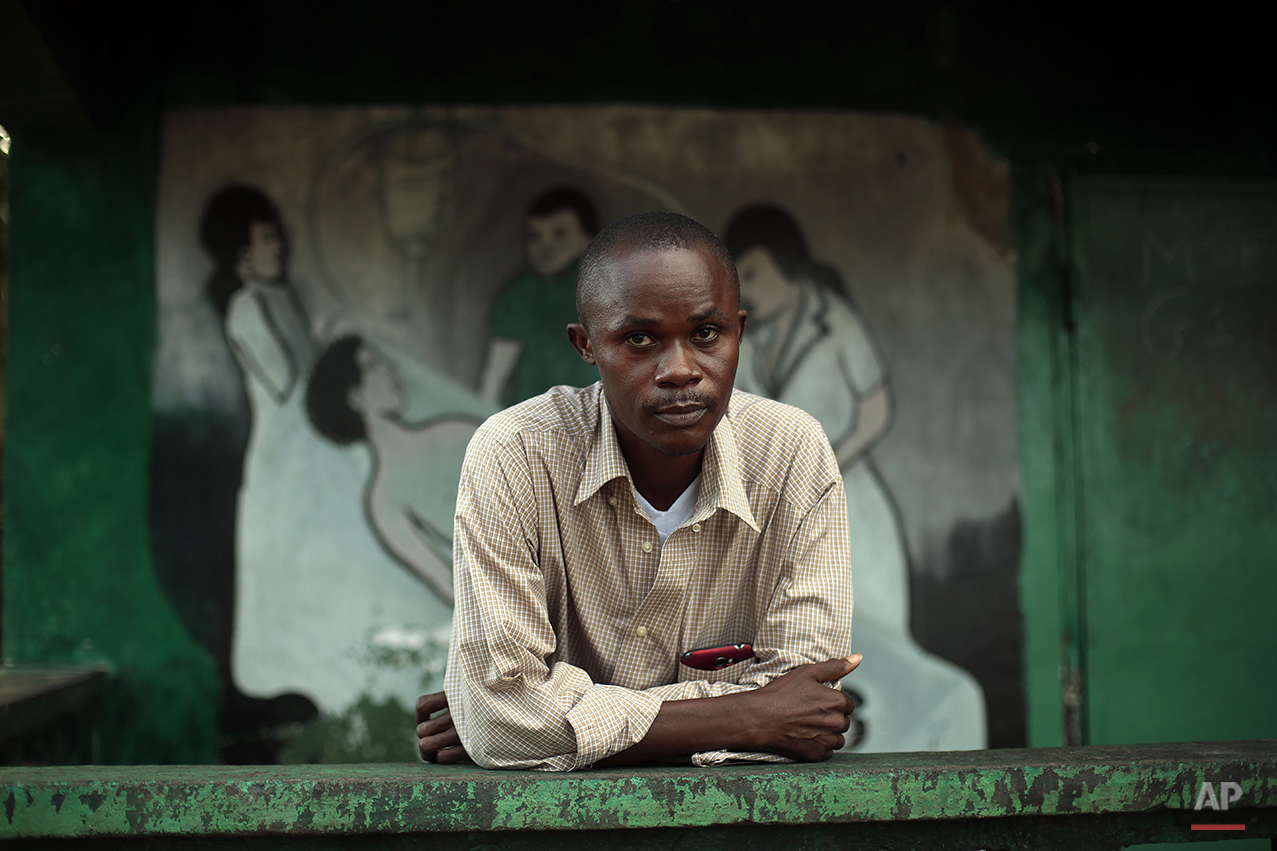
Liberia Ebola No Chance to Say Goodbye
In this picture taken Sunday, Sept. 28, 2014, Julius Prout, 32, poses for a photograph in front of the St Paul Bridge community clinic where he works in Monrovia, Liberia. Falling victim to the Ebola virus after treating more than a dozen others infected, following a traditional funeral, Prout was wrongly declared dead, prompting family members to hold two wakes in his memory. A registered nurse, Prout stunned relative when he called them after recovering from the deadly disease. Prout is now back in his neighborhood, immune from Ebola and eager to help other victims. As the death toll from Ebola soars, crowded clinics are turning over beds as quickly as patients are dying. This leaves social workers and psychologists struggling to keep pace and notify families, who must wait outside for fear of contagion. Also, under a government decree, all Ebola victims must be cremated, leaving families in unbearable pain with no chance for goodbye, no body to bury. (AP Photo/Jerome Delay)
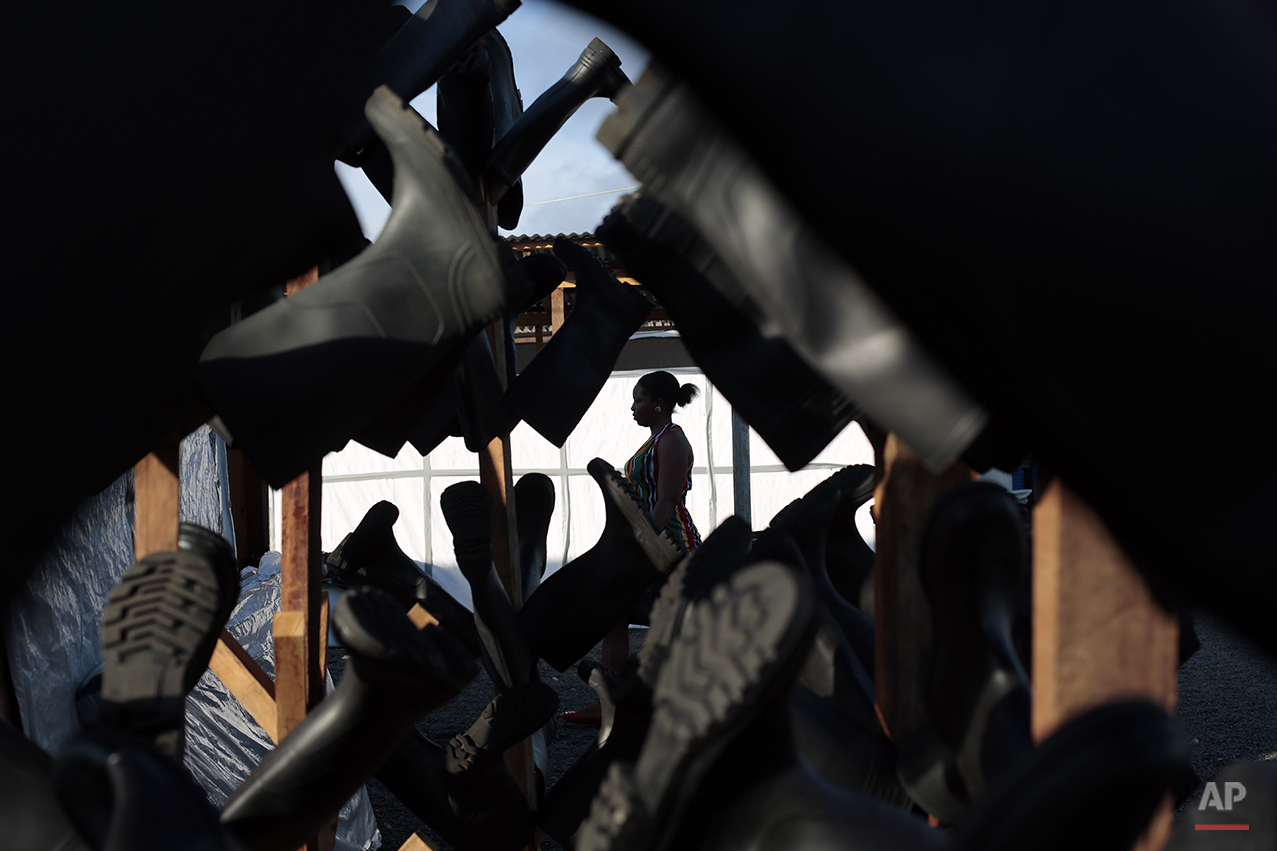
APTOPIX Liberia Ebola
An Medecins Sans Frontieres (MSF) employee walks past drying safety boots at MSF's Ebola isolation and treatment center, in Monrovia, Liberia, Monday Sept. 29, 2014. Six months into the world’s worst-ever Ebola outbreak in West Africa authorities are desperately waiting for shipments of aid to help in the fight of this deadly disease. (AP Photo/Jerome Delay)
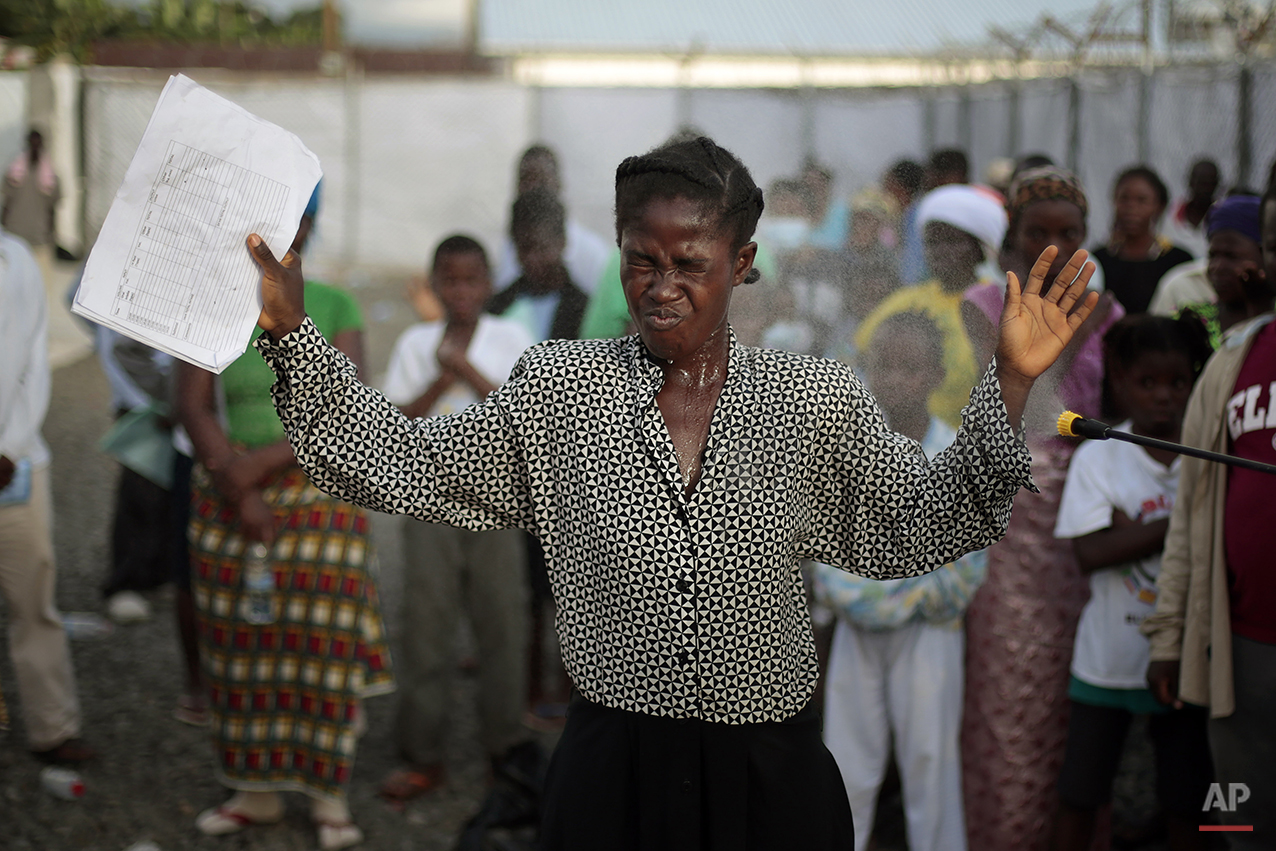
APTOPIX Liberia Ebola
A woman being discharged from the Island Clinic Ebola treatment center in Monrovia, Liberia, is sprayed with disinfectant, Tuesday Sept. 30, 2014. Six months into the world’s worst-ever Ebola outbreak, and the first to happen in an unprepared West Africa, the gap between what has been sent by other countries and private groups and what is desperately needed is huge. Even as countries try to marshal more resources to close the gap, those needs threaten to become much greater, and possibly even insurmountable. (AP Photo/Jerome Delay)
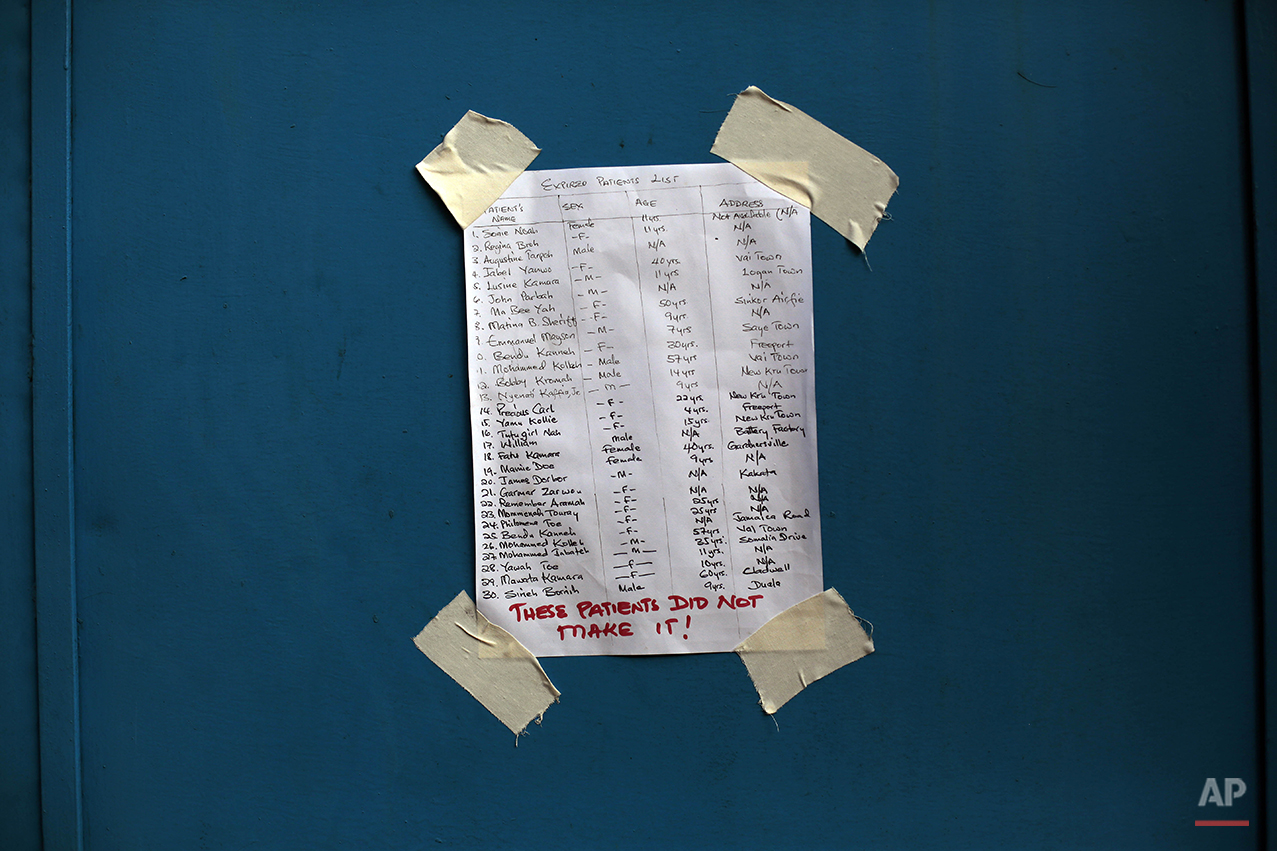
Liberia Ebola
A list showing the names of the day's deceased is taped on the door of the Island Clinic Ebola treatment unit in Monrovia, Liberia, Tuesday Sept. 30, 2014. Six months into the world’s worst-ever Ebola outbreak, and the first to happen in an unprepared West Africa, the gap between what has been sent by other countries and private groups and what is desperately needed is huge. Even as countries try to marshal more resources to close the gap, those needs threaten to become much greater, and possibly even insurmountable. (AP Photo/Jerome Delay)
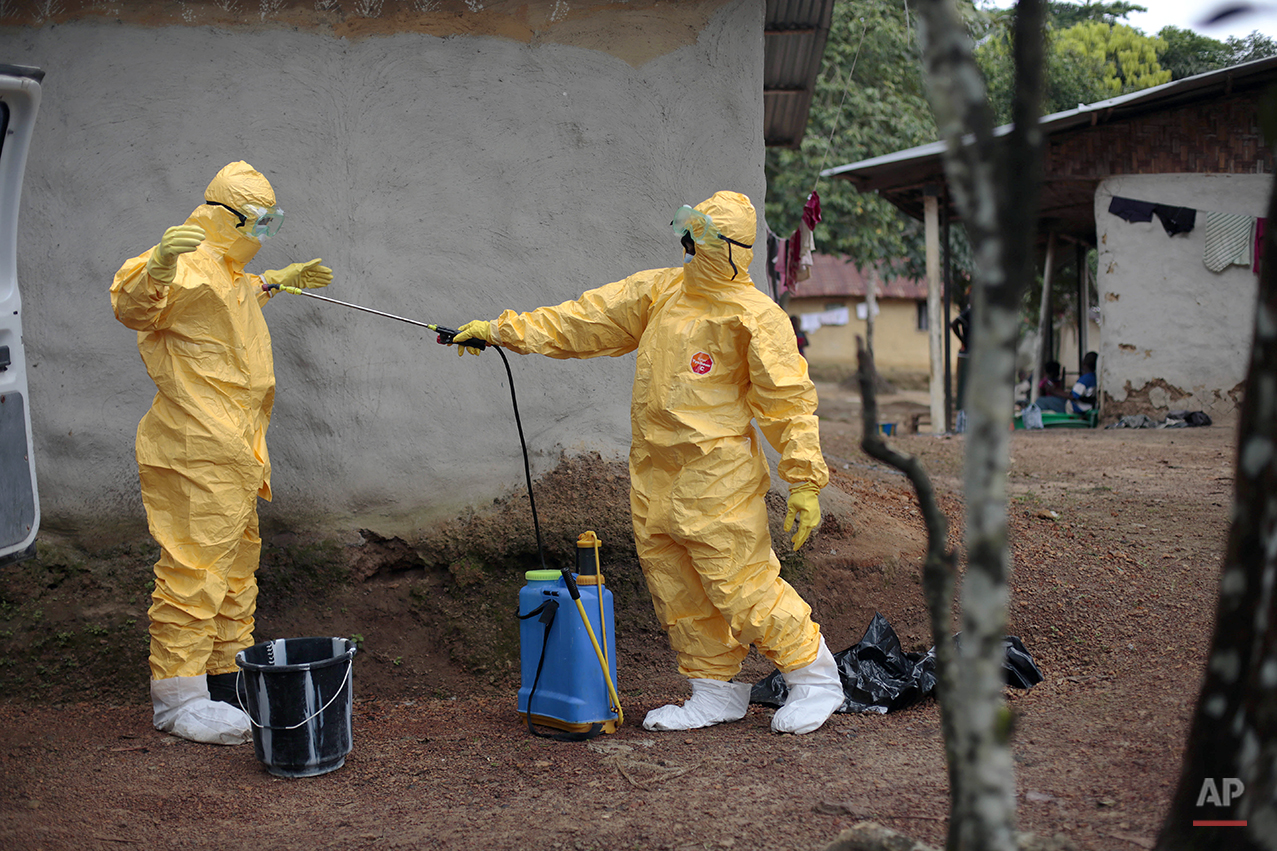
Ebola Liberia
Gordon Kamara, left, is sprayed by Konah Deno after they loaded six patients suspected to have been infected by the Ebola virus into their ambulance in the village of Freeman Reserve, about 30 miles north of Monrovia, Liberia, Tuesday Sept. 30, 2014. Aid donations from western countries are still inadequate, as the international community tries to increase the ability to care for the spiraling number of people infected with the disease which has hit Liberia the hardest.(AP Photo/Jerome Delay)
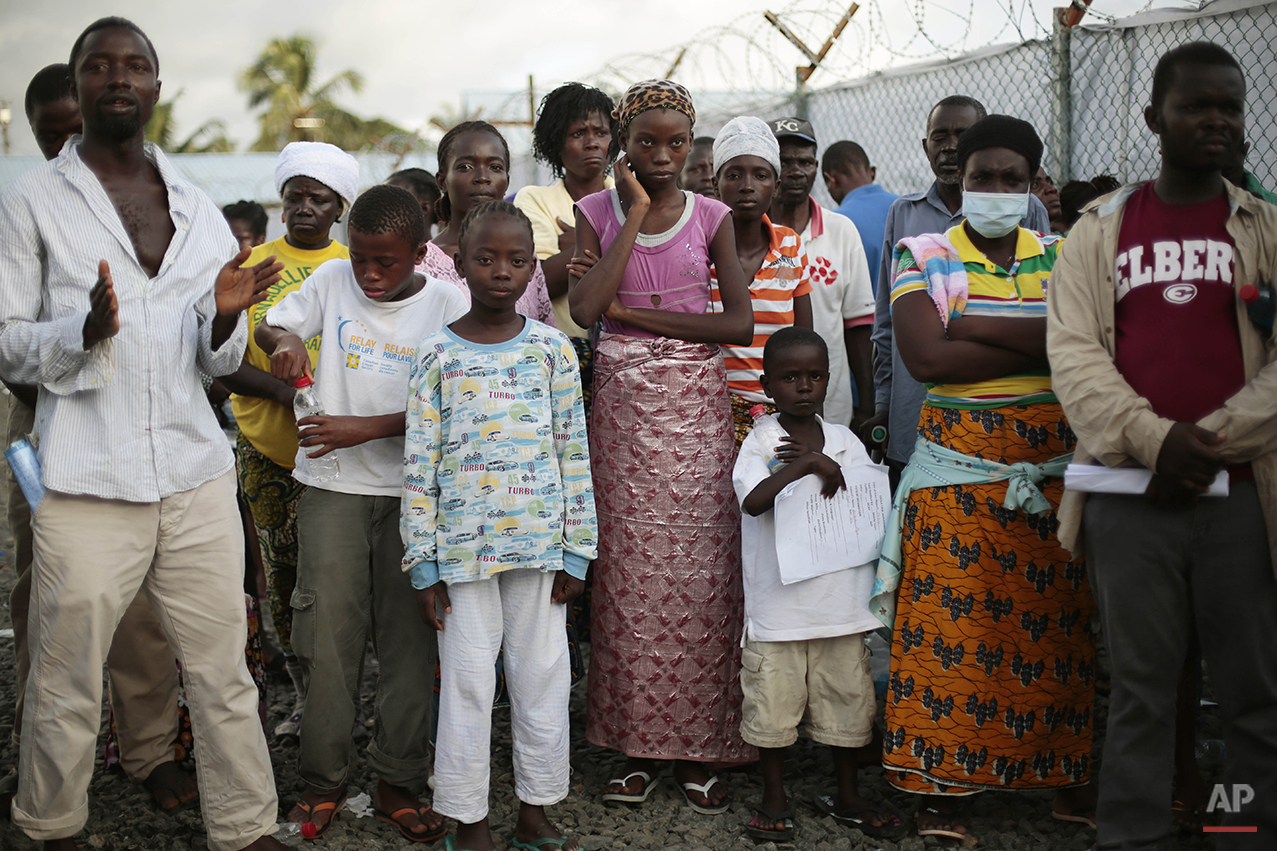
Liberia Ebola
Patients being discharged from the Island Clinic Ebola treatment center in Monrovia, Liberia, wait to be sprayed with disinfectant, Tuesday Sept. 30, 2014. Six months into the world’s worst-ever Ebola outbreak, and the first to happen in an unprepared West Africa, the gap between what has been sent by other countries and private groups and what is desperately needed is huge. Even as countries try to marshal more resources to close the gap, those needs threaten to become much greater, and possibly even insurmountable. (AP Photo/Jerome Delay)
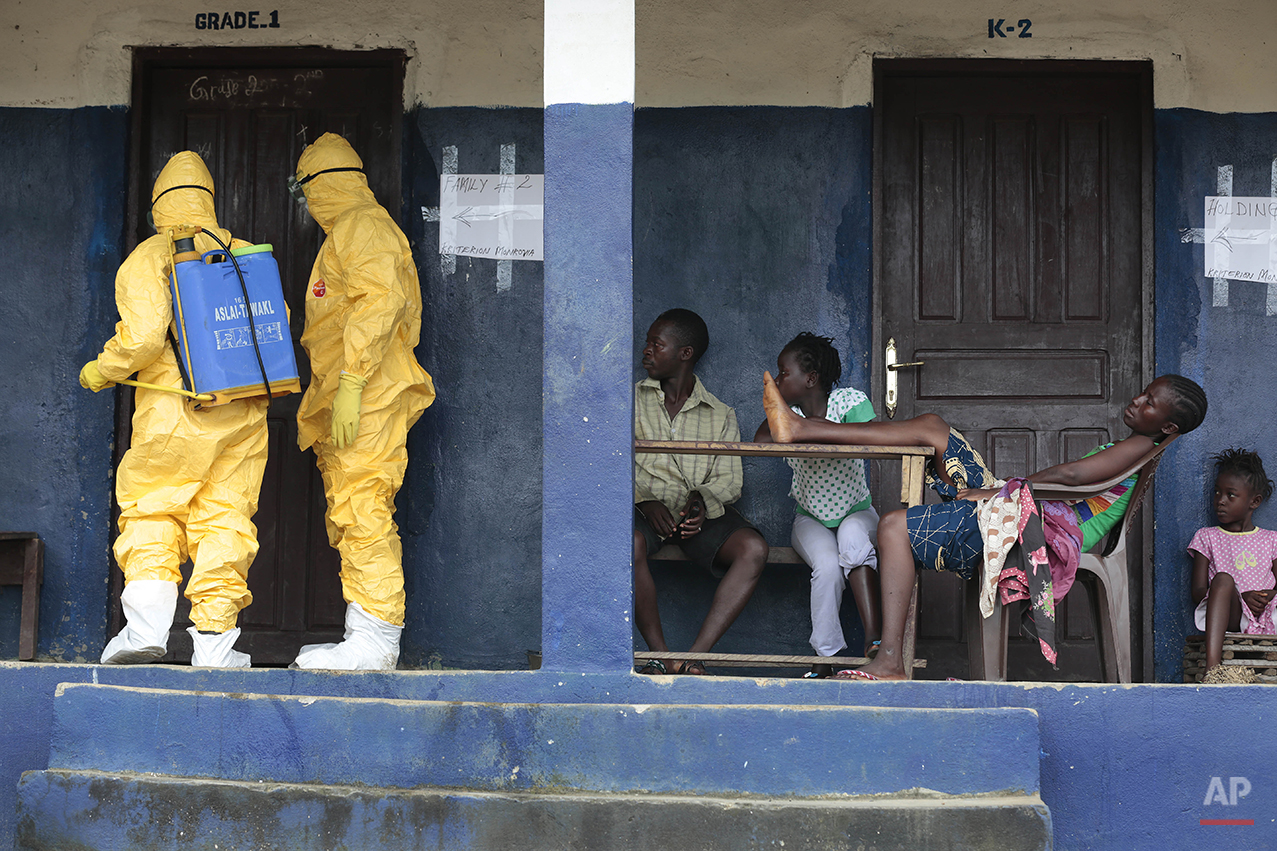
APTOPIX Liberia Ebola
Residents of the village of Freeman Reserve, about 30 miles north of Monrovia, Liberia, watch members of District 13 ambulance service disinfect a room as they pick up six suspected Ebola sufferers that had been quarantined, Tuesday Sept. 30, 2014. Six months into the world’s worst-ever Ebola outbreak, and the first to happen in an unprepared West Africa, the gap between what has been sent by other countries and private groups and what is desperately needed is huge. Even as countries try to marshal more resources to close the gap, those needs threaten to become much greater, and possibly even insurmountable. (AP Photo/Jerome Delay)
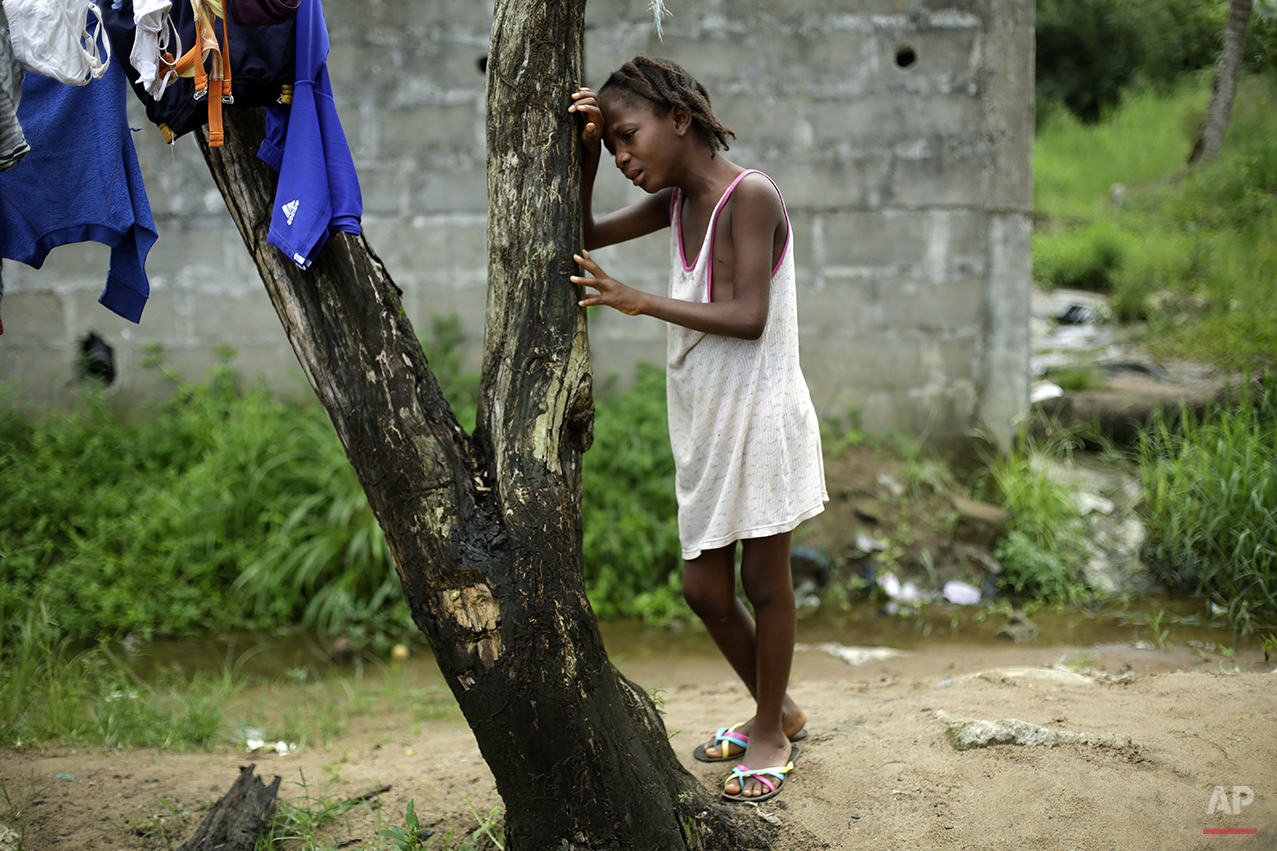
Ebola Liberia
Mercy Kennedy, 9, cries as she learned her mother has died, outside her home in Monrovia, Liberia, Thursday Oct. 2, 2014. Kennedy's mother was taken away by an ambulance to an Ebola ward the day before. (AP Photo/Jerome Delay)
Follow Jerome Delay: Twitter: @jeromedelay | Facebook: jeromedelay
Lead Image Caption: Nowa Paye, 9, is taken to an ambulance after showing signs of the Ebola infection in the village of Freeman Reserve, about 30 miles north of Monrovia, Liberia,Tuesday Sept. 30, 2014. Three members of District 13 ambulance service traveled to the village to pickup six suspected Ebola sufferers that had been quarantined by villagers. Aid donations are still inadequate, as the international community tries to increase the ability to care for the spiraling number of people infected with the disease which has hit Liberia the hardest. (AP Photo/Jerome Delay)
Spotlight is the blog of AP Images, the world’s largest collection of historical and contemporary photos. AP Images provides instant access to AP’s iconic photos and adds new content every minute of every day from every corner of the world, making it an essential source of photos and graphics for professional image buyers and commercial customers. Whether your needs are for editorial, commercial, or personal use, AP Images has the content and the expert sales team to fulfill your image requirements. Visit apimages.com to learn more.
Written content on this site is not created by the editorial department of AP, unless otherwise noted.
AP Images on Twitter | AP Images on Facebook | AP Images on Google+

